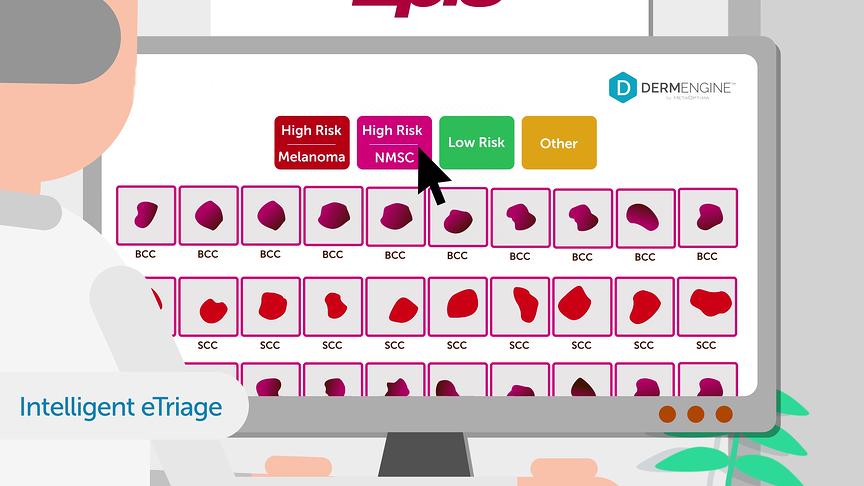AI adoption can have an equal impact on the lives of patients and doctors depending on how it’s used. Real-life implementations unavoidably involve addressing major challenges such as responsible adoption, AI bias and AI ethics which will have an important role in final health outcomes. It is not just about the accuracy of intelligent systems in the development and trial set ups, but most importantly it has to do with real-life scenarios, risk analysis, risk mitigation and excellence in implementation. Assuring that algorithms are aligned with current clinical practices, while avoiding such biases represents the main challenges for the future of intelligent dermatology.
1. The next generation of smart assistants is here
Despite the futuristic imagination of what AI may bring to our lives, real life applications of this technology are far from science-fiction. To date, AI algorithms’ strongest role in dermatology practice are as smart assistants for the analysis of large amounts of image data. In such tasks, their analytical power can hardly be matched by manual human interaction. The same results can be achieved by an algorithm in a fraction of the time while leaving inherent human error aside.
The analytical extent of AI algorithms for image classification has been shown throughout scientific literature, most evidently in the recent publication by Tschandl et al. This work establishes the true potential behind the current use that AI can have in everyday consultation scenarios for dermatologists. The power to classify skin lesion images with a higher accuracy and specificity than a group of experienced human professionals sets an unparalleled record for the assistance that can be confidently obtained from this technology.
Despite the current resistance from some sectors within the field, AI holds such great potential that its utility is slowly - but surely - outweighing any lingering skepticism. Having entered the era of explainable AI, machine learning is to be experienced more as an evidence-based assistant to support clinical decisions rather than an obscure “black box”.
Evidently, the high expectations deposited in this technology can only be sustained with the assurance that machines are here to complement the work of human specialists and not to replace them. AI technology is to be experienced as the intelligent assistant providing extra layers of operability and scrutiny for increased accuracy.
2. What does AI implementation in dermatology look like today?
The complexities of real-life applications for AI in dermatology workflows offers predictable challenges like the need for refinement to match traditional human procedures in clinical decisions. However, there can also be other unexpected factors such as a degree of bias derived from impartial training that algorithms receive from the inputted skin images by humans in the loop.
Biases can clearly have a detrimental impact on the support to clinical decision-making that AI provides:
1- Bias in the devices used to collect image data: variations generated from dermoscopes, digital cameras, lighting systems or any other mobile devices used for imaging
2- Artifacts as captured during imaging: such as human annotations using ink, lighting artifacts, human preference for different imaging modes (polarized vs non-polarized, contact vs. non contact caps imaging)
3- User selection deviation: inclusive of the bias in data distribution of predictable outliers, such as rare diseases.
For all these scenarios, an intelligent system should be able to predict them and have a mitigation strategy deployed. This can be as simple as communicating the right message with users about such inherent limitations, where the AI assistant does not have enough information matching test cases thus avoiding being forced to make a low confidence decision. Considering the seriousness and importance of these limitations, it is crucial that challenges can be properly addressed and communicated through the democratization of data handling, as performed by citizen data scientists.
Interestingly enough, when seen together, advantages are proven to far exceed the current challenges present in the field: an opportunity for machines to become strategic allies for improving daily workflows by increasing the diagnostic accuracy of skin conditions diagnosis. In MetaOptima’s intelligent dermatology solution, DermEngine, AI can be seen as a smart assistant - a silicon-made colleague capable of providing educated insight on a given case based upon the collective knowledge obtained from a large number of diverse clinical cases.
Practically speaking, DermEngine’s intelligent eTriage solution acts as an interactive, real-time portable library of past documented cases to support better informed clinical decisions on current skin condition cases. This allows for categorizing images submitted by primary care providers to dermatology and dermato-oncology centres of excellence for streamlined clinical decision-making processes. The power of AI-driven systems offers a no-risk implementation as a better resource management resulting in highly integrated healthcare systems. Major health institutions can then expand their service coverage to millions of patients for a fraction of the costs, time and resources currently employed.
Final thoughts
The observed AI implementation in dermatology clearly testifies to what is still left to be done for this technology to achieve its full utilization for patients and doctors alike. Nevertheless, its potential to serve with unparalleled accuracy in the early detection of cancer and other skin conditions is an admirable feat capable of revolutionizing dermatological processes. AI supporting doctors as an unrivalled tool that can bring new breakthroughs in the field will be its greatest contribution to intelligent dermatology.
-The MetaOptima Team
Would you like to stay updated on the latest news of MetaOptima and its dermatology EMR solution, DermEngine? Subscribe to our blog below! If you're ready to experience DermEngine's intuitive features for yourself, sign up for a demo today!






